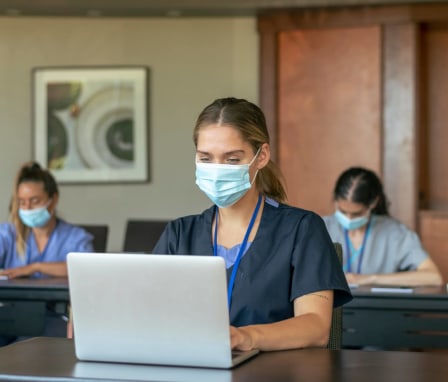What to Know About Getting a BSN Degree: Common Courses and Requirements
 Credit: Fly View Productions / E+ / Getty Images
Credit: Fly View Productions / E+ / Getty ImagesAs the demand for highly educated nurses continues to grow, earning a bachelor of science in nursing (BSN) has become more than just a competitive advantage — it’s quickly becoming the standard.
Based on responses from 643 hospitals and healthcare organizations, nearly 95% require or strongly prefer new hires to hold a BSN.
This shift reflects the increasing complexity of patient care and the emphasis on professional development. Understanding the common courses, clinical hours, and technical requirements for a BSN degree can help you successfully plan a rewarding and purposeful nursing career.
Bachelor of Science in Nursing (BSN) Degree at a Glance
- Avg. Program Length: 4 Years
- Avg. Credits Required: 120-130 credit hours
- Avg. Earning Potential:$66,030-$135,320
- Offered Online? Partially
- Clinical Hours Required: 700-800 hours
- Program Traits: Critical thinking, clinical judgment, leadership, evidence-based practice, health promotion, and professional accountability
BSN Program: The Skills You Need
A BSN is a four-year degree that prepares you to take the NCLEX-RN for licensure. It builds clinical, leadership, and critical-thinking skills, enabling you to work with more complex patient cases and healthcare settings and prepares you for faster career advancement.
BSN Professional and Technical Requirements
After completing coursework and clinical training, you must meet professional and technical standards that prepare you to deliver safe, effective care. These include skills in communication, critical thinking, and hands-on patient care.
Technical Skills
Clinical preceptors and professors evaluate nursing students during labs and clinicals to ensure they can perform essential technical tasks. These include monitoring vital signs, administering medications and IVs, and delivering proper wound care.
Decision-Making and Critical-Thinking Requirements
Critical thinking is essential in clinical nursing. Effective patient care depends on your sound judgment. You must develop skills in reasoning, analysis, and decision-making to assess situations and deliver safe, accurate treatment.
Observation Abilities
Nurses must closely observe patients to assess their condition, detect signs of illness, and identify potential risks. Your clinical hours train you to recognize changes, evaluate the impact, and make objective assessments.
Good Communication
Effective communication enables you to interact clearly with patients, families, and multidisciplinary healthcare teams. You learn to read verbal and nonverbal cues, produce effective written documentation, and become skilled at active listening to support coordinated care.
Social Requirements
A strong work/life balance protects your emotional and mental health and helps you make sound clinical decisions. Recognizing a compassionate and culturally competent approach to therapeutics helps you connect with a diverse population and support effective patient care.
BSN Admission Requirements
Admission requirements for a BSN may differ between programs, but most have the same basic criteria for a competitive selection process. Before applying to a nursing program, you should understand the process.
Some programs give preference to candidates with prior healthcare experience. While each program has specific criteria and a timeline for admission, the basic requirements include:
- Cumulative 2.75 GPA or higher from a high school or associate degree program
- 2.5 GPA or higher for all science courses
- Essay
- References
- CV or resume
- Significant volunteer experience
- Prerequisite coursework in anatomy, biology, chemistry, organic chemistry, microbiology, and physiology
Schools define the number of transfer credits they allow, which can depend on the courses you want to transfer and the level of nursing education. For example, a BSN may allow you to transfer more credits than an associate degree in nursing.
BSN Degree Curriculum
The BSN curriculum builds a strong foundation in clinical practice and professional nursing principles. Your education will emphasize critical thinking, effective communication, and compassionate care to prepare you for success in modern healthcare environments.
Accredited nursing programs must include required clinical hours and courses, but academic institutions can offer some variety in their requirements. Most programs include the following classes:
- Assessment of Health and Illness
- Community Health Nursing
- Critical Thinking
- Health Maintenance and Restoration
- Health Promotion and Risk Reduction
- Human Anatomy
- Human Growth and Development
- Leadership and Management
- Mental Health
- Microbiology
- Nursing Care I and II
- Nursing Informatics
- Nutritional Science
- Organizational Systems
- Pathophysiology
- Pharmacology
- Psychology
- Research in Nursing
- Reproductive Health
- Statistics
BSN Clinical Hours Requirements
BSN students must complete clinical hours to apply classroom learning in professional settings. All students, whether traditional or online, must complete in-person clinicals arranged through local healthcare partners.
During clinicals, students work under licensed nurses to build core skills, such as monitoring vitals, conducting assessments, and administering medications. Clinical hours must provide various experiences in specialties like geriatrics, pediatrics, mother/child, and adult medicine to prepare students for their first RN position.
FAQ: Getting a BSN Degree
A bachelor of science in nursing (BSN) is not a higher license than a registered nurse (RN), but it may mean a higher level of education. RNs can hold either an associate degree or a BSN. Many hospitals now prefer or require a BSN for leadership roles or Magnet designation.
Related Pages

Bachelor of Science in Nursing (BSN) Overview
Learn about bachelor of science in nursing (BSN) programs, including RN-to-BSN degrees. Explore BSN pathways, requirements, and jobs after graduation.

The Best Online BSN Programs in 2025
A bachelor of science in nursing (BSN) is preferred by many employers. Discover more professional opportunities and autonomy with one of our top online BSN programs.